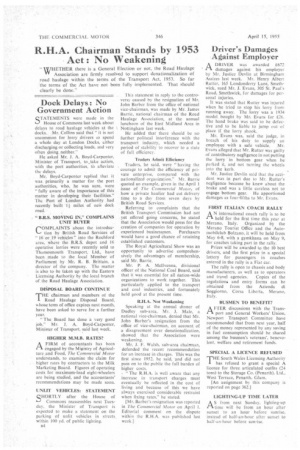R.H.A. Chairman Stands by 1953 Act : No Weakening
Page 38

If you've noticed an error in this article please click here to report it so we can fix it.
" WHETHER there is a General Election or not, the Road Haulage Association are firmly resolved to support denationalization of road haulage within the terms of the Transport Act, 1953. So far the terms of the Act have not been fully implemented. That should clearly be done."
This statement in reply to the controversy caused by the resignation of Mr. John Barber from the office of national vice-chairman, was made by Mr. James Barrie, national chairman of the Road Haulage Association, at the annual luncheon of the East Midland Area in Nottingham last week.
He added that there should be no further political interference with the transport industry, which needed a period of stability to recover to a state of full efficiency.
Traders Admit Efficiency Traders, he said, were " having the courage to admit the efficiency of private enterprise, compared with the nationalized organization." Mr. Barrie quoted an example, given in the April 1 issue of The Commercial ,44oi.or, of how a private haulier had cut delivery time to a day from seven days by British Road Services.
Referring to complaints that the British Transport Commission had not yet offered going concerns, he stated that the Association would press for the creation of companies for operation by experienced businessmen. Purchasers would have a good chance of retaining established customers.
The Royal Agricultural Show was an opportunity to advertise comprehensively the advantages of membership, said Mr. Barrie.
Mr. P. A. McIlvenna, divisional officer of the National Coal Board, said that it was essential for all nation-wide. organizations to work together. This particularly applied to the transport and coal industries, and fortunately held good at the present time.
R.H.A. Not Weakening Speaking at the annual dinner of Dudley sub-area, Mr. J. Male, a national vice-chairman, denied that Mr. John Barber's resignation from the office of vice-chairman, on account of a disagreement over denationalization, showed that the Association were weakening.
Mr. J. F. Walsh, sub-area chairman, defended the recent recommendation for an increase in charges. This was the first since 1952. he said, and did not pass on to the public the full burden of higher costs.
The R.H.A. is well aware that any increase in transport charges must eventually be reflected in the cost of living and because of this we have always exercised considerable restraint when fixing rates," he stated.
[Mr. Barber's resignation was reported in The Commercial Motor on April 1. Editorial comment on the dispute within the R.H.A. was published last week.]




































































































